 Petzlover
Petzlover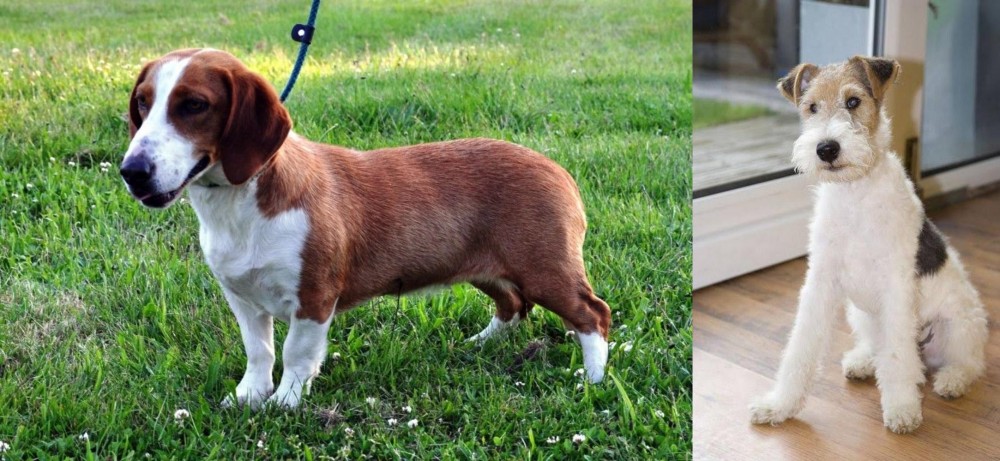 Drever is originated from Sweden but Wire Fox Terrier is originated from United Kingdom. Both Drever and Wire Fox Terrier are having almost same height. Drever may weigh 7 kg / 16 pounds more than Wire Fox Terrier. Both Drever and Wire Fox Terrier has almost same life span. Both Drever and Wire Fox Terrier has same litter size. Drever requires Low Maintenance. But Wire Fox Terrier requires Moderate Maintenance
Drever is originated from Sweden but Wire Fox Terrier is originated from United Kingdom. Both Drever and Wire Fox Terrier are having almost same height. Drever may weigh 7 kg / 16 pounds more than Wire Fox Terrier. Both Drever and Wire Fox Terrier has almost same life span. Both Drever and Wire Fox Terrier has same litter size. Drever requires Low Maintenance. But Wire Fox Terrier requires Moderate Maintenance
 The Drever dog hails from Sweden, being brought from Germany to the Scandinavian country in 1910. As a scenthound, in spite of his short legs, he was once used for hunting purposes, having a keen nose.
The Drever dog hails from Sweden, being brought from Germany to the Scandinavian country in 1910. As a scenthound, in spite of his short legs, he was once used for hunting purposes, having a keen nose.
The dog was developed from the Westphalian Dachsbracke and then crossbred with other Swedish hounds.
By the 1940s there were two distinctive sizes of this Dachsbracke dog and the larger one was named Drever. It was in 1947 that the Drever was then recognized by the Swedish Kennel Club as a separate breed. It was also recognized by a number of other clubs and registries.
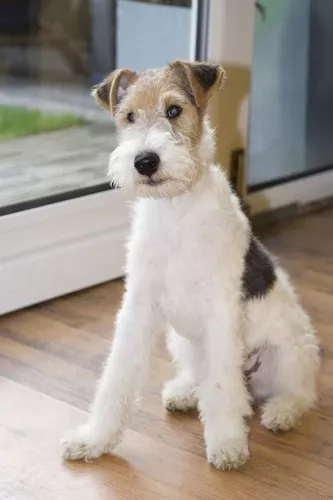 The wire fox terrier was developed in England by fox hunting enthusiasts. They wanted a feisty dog that could chase foxes down their burrows.
The wire fox terrier was developed in England by fox hunting enthusiasts. They wanted a feisty dog that could chase foxes down their burrows.
It is thought that the dog descended from the rough-coated black and tan working terriers of Wales.
The dog wasn’t popular as a pet until the 1930s when its appearance in certain films gave it a popularity-boost.
 Looking quite similar to the Beagle, the Drever is a medium sized dog which stands at about 32 – 38cm and weighing between 14 and 16kg.
Looking quite similar to the Beagle, the Drever is a medium sized dog which stands at about 32 – 38cm and weighing between 14 and 16kg.
He has a fairly long body but unlike the Dachshund his short legs are straight and aren’t bent. The nose of the dog is fairly large and black and the ears are quite long, much like a Beagle dog.
The eyes are bright, alert and dark and the expression on the dog’s face is amicable and gentle.
He has a short, dense coat and is looked upon as a moderate to heavy shedder. The coat can be in several colors such as brown or tan and black with white markings over the face, neck, chest and feet. He has floppy ears and a long tail carried downwards.
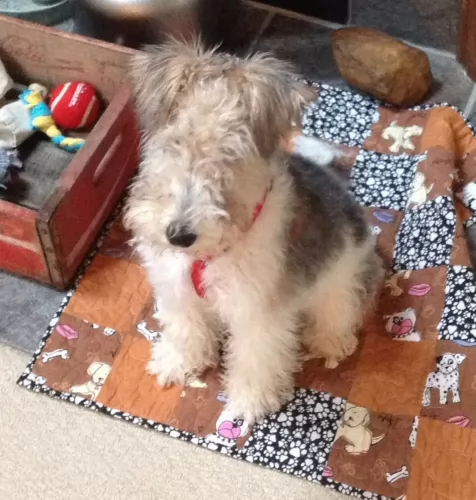 The Wire Fox Terrier is a sturdy, medium-sized dog that weighs between 7 and 9kg and stands between 35 and 39cm at the withers.
The Wire Fox Terrier is a sturdy, medium-sized dog that weighs between 7 and 9kg and stands between 35 and 39cm at the withers.
The dog’s double coat is essentially white with brown or tan markings and can be medium length and wiry, tending to be curly too.
He is a light shedder. The face is long, without much shape and eyes appear to be fairly close together. The ears are fairly small and they fold forward toward the cheeks. The tail is docked and is held high.
This really is an intelligent dog and can’t tolerate being bored. It’s essentially a companion dog too and doesn't want to be separated from his owners for too long.
As a companion dog he is going to want a lot of attention. They’re independent and strong-willed and will benefit from training and socialization.
They are great around children but they do need to be supervised as they are inclined to nip, especially when highly excited. They also bark quite a bit and the owner might have to do something to stop this yapping, especially when the dog is bored.
 The Drever dog is an easy dog to have around, not requiring any special treatment to keep him happy.
The Drever dog is an easy dog to have around, not requiring any special treatment to keep him happy.
He gets on well with every member of the family as well as any pets in the home and fits easily into city- or country life.
He is an active dog however, and will require exercising to avoid him becoming frustrated.
Treat your amicable Drever with the attention he deserves and you’ll have a friendly, calm and devoted pet who wants to be your best friend.
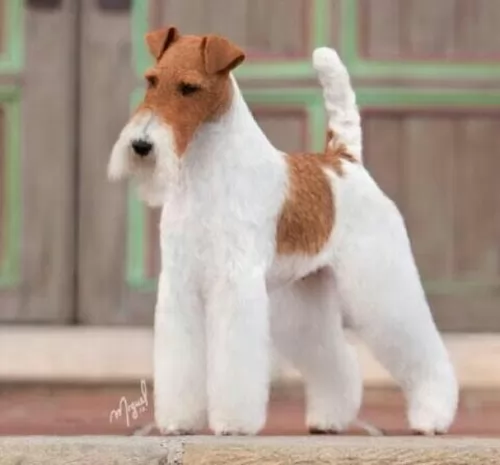 The Wire Fox Terrier is such a canine friend, ready to be with you no matter what you’re doing. They are social dogs and love being involved with their human companions.
The Wire Fox Terrier is such a canine friend, ready to be with you no matter what you’re doing. They are social dogs and love being involved with their human companions.
He is independent but still social and enthusiastic and you can describe him as the ideal family dog.
He is a bundle of energy, and when you bring him into your home, you’re going to get a family member who is playful, joyful, loving and loyal – your very best friend.
 The Drever is a dog which enjoys good health generally, and with good care he can reach 12 to 15 years of age. The Drever, similar to other dogs, may be susceptible to some common health concerns that any healthy dog can experience such as back pain, hip dysplasia, eye diseases, obesity, diabetes and others.
The Drever is a dog which enjoys good health generally, and with good care he can reach 12 to 15 years of age. The Drever, similar to other dogs, may be susceptible to some common health concerns that any healthy dog can experience such as back pain, hip dysplasia, eye diseases, obesity, diabetes and others.
Veterinary care is an important part of a dog’s health – from puppyhood to the senior years. However, the frequency of visits you make to your vet with your adult dog will depend on his health.
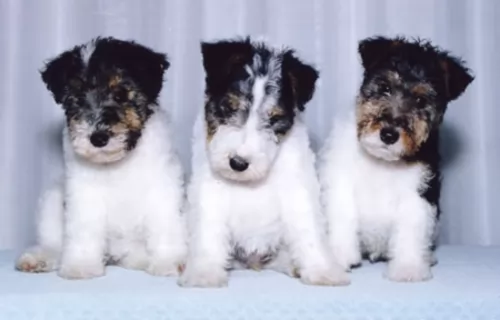 These are healthy dogs, and if you get your dog from a responsible breeder, he will have been checked for health conditions such as cataracts, hip dysplasia, and luxating patellas.
These are healthy dogs, and if you get your dog from a responsible breeder, he will have been checked for health conditions such as cataracts, hip dysplasia, and luxating patellas.
Cataracts are a problem with the lens of the eye. The lens focuses light and it should be crystal clear. A cataract obscures vision. Sometimes the cataract can be very small but other times it can grow to the size of the lens and then it can cause blindness.
Most times, dogs with cataracts can still see, and even though a dog may experience some confusion with a cataract, they don’t hurt the dog. They don’t go away on their own and will need to be removed surgically. If you see your dog has a cataract, consult your vet to get their opinion on the matter.
Your dog may be licking and scratching a lot and it may just be that your dog has a frustrating and irritating skin problem. This itching isn’t a disease but rather a cause of some disease.
There could be so many things that are causing your pet to scratch and it could be a skin disease, parasites or allergies. It can be terrible seeing the frustration it causes your pet and he will certainly need to see the vet.
 It is important to feed your dog food that will cater to his digestion. That is why some of the best commercially manufactured foods are so good – they cater specifically for a dog’s age, his size, his activity levels and for any illnesses he may have.
It is important to feed your dog food that will cater to his digestion. That is why some of the best commercially manufactured foods are so good – they cater specifically for a dog’s age, his size, his activity levels and for any illnesses he may have.
In terms of activity levels, the Drever is an active dog, quite capable of chasing prey for long distances without tiring. This is why some dog foods are breed- and activity specific.
A good brand of kibble mixed with some cooked brown rice, vegetables and chicken will be excellent for your pet. Remember, if at all possible, to include some raw meat into the diet from time to time. Cool, fresh water should be available at all times.
Maintaining your Drever’s short, coarse coat won’t be a hassle, and you can call him a low maintenance dog. All that is essentially required is for you to give his coat a good brush twice a week. Nails will also need to be checked as well as his ears. Ignoring his ears can lead to wax build up and dirt and this can result in infection.
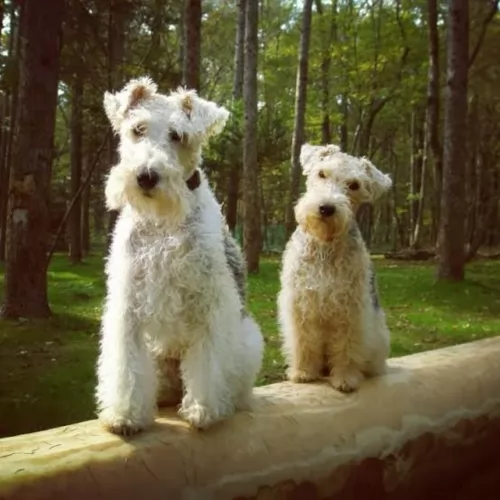 This dog will need to be brushed regularly. Some people hand-strip their dogs. Most people prefer just to take their pets to a professional groomer to have them professionally clipped. The groomers will simultaneously clip his nails, clean the inside of his ears and also clean his teeth.
This dog will need to be brushed regularly. Some people hand-strip their dogs. Most people prefer just to take their pets to a professional groomer to have them professionally clipped. The groomers will simultaneously clip his nails, clean the inside of his ears and also clean his teeth.
The Wire Fox Terrier will expect you to supply him with high-quality dog food if you opt to use commercially manufactured dog food. These foods can be wonderfully convenient but you want the food to be packed with natural ingredients and be high in vitamins and minerals.
Any diet should also be appropriate to the dog’s age, his size, and his activity levels. Some homemade foods can also be a treat but this needs to be simple with no heavy spicing. Things such as boiled chicken, brown rice and vegetables can be an excellent choice.